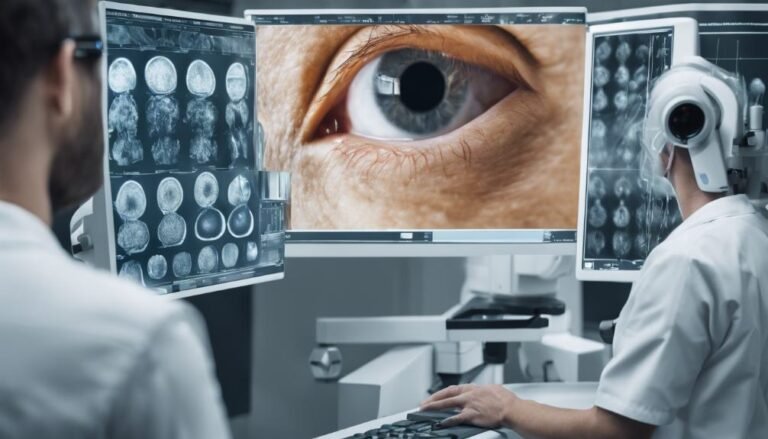AI in Oncology: Diagnosis and Treatment
Did you know that AI has shown a 95% accuracy rate in detecting cancer, surpassing human capabilities? The integration of artificial intelligence in oncology has opened new avenues for precise diagnosis and tailored treatment strategies. As you explore the impact of AI in revolutionizing cancer care, you will uncover the intricate ways in which technology is reshaping the field of oncology, paving the path for more effective and personalized patient care.
Key Takeaways
- AI enhances early cancer detection through advanced screening processes.
- Precision medicine tailors treatment plans based on genetic testing advancements.
- Machine learning predicts patient outcomes for personalized treatment plans.
- Automated image interpretation aids in accurate tumor detection and monitoring.
- AI optimizes radiotherapy by refining treatment planning and delivery.
AI-Powered Cancer Detection
Utilizing advanced algorithms and machine learning techniques, AI-powered cancer detection systems have revolutionized the early diagnosis and identification of various types of cancer in clinical settings. AI-driven tumor detection has shown remarkable accuracy and efficiency in analyzing medical imaging such as MRIs, CT scans, and X-rays to detect tumors at their earliest stages. These systems can analyze vast amounts of data quickly, identifying subtle patterns that may indicate the presence of cancer cells.
Cancer screening advancements have been propelled by AI technology, enabling healthcare providers to detect abnormalities that may have been overlooked by human eyes alone. By augmenting the capabilities of medical professionals, AI-driven tumor detection systems enhance the overall accuracy of cancer screenings, leading to earlier interventions and improved patient outcomes.
Through continuous learning and adaptation, these systems refine their diagnostic capabilities, ensuring that they stay at the forefront of cancer detection methodologies. The integration of AI in cancer screening represents a significant leap forward in the fight against this complex disease.
Precision Medicine Applications
You can explore how genetic testing advancements have revolutionized oncology by enabling the identification of specific genetic mutations driving cancer growth.
By analyzing these mutations, oncologists can tailor personalized treatment plans that target the unique characteristics of each patient's tumor.
This precision approach not only enhances treatment effectiveness but also minimizes potential side effects, highlighting the essential role of AI in guiding precision medicine applications in oncology.
Genetic Testing Advancements
Recent advancements in genetic testing have revolutionized the field of oncology, particularly in the application of precision medicine for personalized diagnosis and treatment strategies. Ethical implications surrounding genetic testing in oncology pertain to issues such as informed consent, potential psychological impacts of genetic information, and disparities in access to testing.
Clinical implementation of genetic testing involves integrating test results into treatment decisions, monitoring treatment response, and identifying individuals at high risk for developing cancer. Data privacy concerns arise due to the sensitive nature of genetic information, necessitating secure storage and transmission methods to protect patient confidentiality. Regulatory challenges encompass ensuring the accuracy and reliability of genetic tests, establishing guidelines for interpreting results, and addressing inconsistencies in reimbursement policies.
Despite these challenges, genetic testing advancements hold immense promise for improving cancer care by enabling tailored treatment approaches based on individual genetic profiles, ultimately leading to more effective and personalized oncology interventions.
Personalized Treatment Plans
Advancements in genetic testing have paved the way for the implementation of personalized treatment plans in oncology through precision medicine applications. Treatment customization based on individual genetic profiles is at the forefront of improving patient outcomes.
By analyzing a patient's genetic makeup, oncologists can tailor treatments to target specific mutations or biomarkers present in the tumor cells, leading to more effective and personalized care.
Personalized treatment plans offer several advantages in oncology. They enhance treatment effectiveness by ensuring that patients receive therapies that are more likely to work based on their genetic characteristics. This approach also helps in minimizing the potential side effects of treatments that may not be beneficial for a particular individual.
Additionally, personalized care contributes to better patient outcomes by increasing the chances of successful treatment responses and improving overall quality of life during and after cancer therapy.
Role of Machine Learning
How does machine learning play a crucial role in the field of oncology, specifically in the domains of diagnosis and treatment?
Machine learning applications have revolutionized oncology by enabling predictive modeling for patient outcomes and treatment responses. Through the analysis of vast amounts of data, machine learning algorithms can identify patterns and predict potential outcomes based on individual patient characteristics, genetic markers, and treatment regimens.
AI-driven treatment strategies leverage machine learning to personalize treatment plans for patients, taking into account factors such as tumor characteristics, genetic mutations, and patient history. By incorporating predictive modeling, these strategies aim to optimize treatment efficacy and minimize potential side effects. Additionally, outcome analysis using machine learning algorithms allows for continuous evaluation of treatment responses and adjustments to improve patient outcomes.
In essence, machine learning in oncology not only enhances diagnostic accuracy but also empowers healthcare providers with valuable insights to tailor treatment approaches for each patient, ultimately leading to more effective and personalized cancer care.
Automated Image Interpretation
Machine learning in oncology has paved the way for significant advancements in automated image interpretation techniques, particularly in the analysis of medical imaging scans for diagnostic and treatment purposes. Automated image interpretation holds immense promise in enhancing accuracy and improving efficiency in oncology. By leveraging machine learning algorithms, this technology can assist in the rapid and precise analysis of complex imaging data, such as MRI, CT scans, and X-rays.
These algorithms can detect subtle patterns and features within images that may not be easily discernible to the human eye, enabling earlier and more accurate detection of tumors or abnormalities. Automated image interpretation not only aids in the initial diagnosis but also plays an essential role in monitoring disease progression and evaluating treatment effectiveness over time.
Moreover, these systems can help reduce the burden on healthcare professionals by streamlining the interpretation process, allowing for quicker decision-making and treatment planning.
As research in this field continues to evolve, automated image interpretation is poised to revolutionize oncology by providing clinicians with powerful tools to deliver more precise and efficient care to patients.
Personalized Treatment Plans
You can benefit from tailored treatment algorithms, which leverage AI to analyze a multitude of factors unique to your case.
These algorithms can then generate patient-specific drug recommendations based on your individual genetic makeup, tumor characteristics, and treatment history.
This personalized approach enhances the precision and efficacy of cancer treatments, leading to improved outcomes and better quality of life for patients.
Tailored Treatment Algorithms
Tailored treatment algorithms in oncology leverage patient-specific data to create personalized treatment plans that optimize therapeutic outcomes and minimize adverse effects. Treatment customization, AI-driven approaches offer a significant advancement in providing personalized care through algorithm-based decision-making processes. By integrating vast amounts of patient data, including genetic profiles, imaging results, treatment history, and real-time monitoring data, AI algorithms can analyze complex relationships to tailor treatment strategies to individual patients. These algorithms consider factors like tumor characteristics, molecular markers, and patient preferences to recommend the most effective treatment options.
AI-driven tailored treatment algorithms have the potential to revolutionize oncology by streamlining the decision-making process for healthcare providers, enhancing treatment efficacy, and improving patient outcomes. Through continuous learning and adaptation, these algorithms can evolve with new data, leading to more precise and effective personalized care plans.
As the field of oncology continues to embrace AI technologies, the development and implementation of tailored treatment algorithms hold promise for optimizing patient care and treatment outcomes in the fight against cancer.
Patient-Specific Drug Recommendations
Analyzing patient-specific data, including genetic profiles and treatment history, enables the creation of personalized treatment plans that recommend specific drugs based on individual characteristics and needs in oncology.
AI algorithms process vast amounts of data to identify patterns that correlate with drug efficacy and treatment outcomes. By incorporating information on genetic mutations, biomarkers, and previous responses to therapy, AI systems can predict which drugs are most likely to be effective for a particular patient.
These personalized treatment plans not only consider the effectiveness of drugs but also take into account potential side effects and drug interactions. By tailoring drug recommendations to individual patients, oncologists can optimize treatment strategies, leading to improved outcomes and reduced adverse effects.
AI-driven personalized drug recommendations empower healthcare providers to make more informed decisions, increasing the likelihood of successful treatment outcomes while minimizing unnecessary exposure to ineffective therapies.
This precision medicine approach is revolutionizing oncology by offering patients treatments tailored to their unique biological makeup and disease characteristics.
Genetic Profiling Advancements
With advancements in genetic profiling, oncologists are now able to pinpoint specific genetic mutations in cancer cells, guiding more precise and personalized treatment strategies. Tumor profiling plays a pivotal role in identifying these genetic alterations, allowing for a deeper understanding of the molecular landscape driving cancer progression. This information is essential for therapeutic targeting, as it enables oncologists to tailor treatment regimens based on the unique genetic makeup of each patient's tumor.
Genetic profiling advancements have revolutionized oncology by providing insights into the underlying mechanisms of cancer development and progression. By identifying key genetic mutations, oncologists can select targeted therapies that are more likely to be effective in combating the specific genetic drivers of the disease.
This personalized approach to cancer treatment not only improves patient outcomes but also minimizes the risk of unnecessary side effects from traditional treatments that may not be as targeted.
Enhancing Clinical Decision-Making
Utilizing artificial intelligence (AI) algorithms can greatly enhance the precision and efficiency of clinical decision-making in oncology. AI enables the integration of extensive patient data from various sources such as electronic health records, imaging studies, genomic data, and real-time patient monitoring. Through advanced machine learning algorithms, AI can analyze this data rapidly and accurately to provide clinicians with valuable insights for making informed treatment decisions.
AI in Radiotherapy Optimization
AI plays a pivotal role in optimizing radiotherapy by enhancing treatment planning and delivery processes through advanced algorithms and data analysis. Treatment optimization is a vital aspect of radiotherapy, and AI contributes immensely by streamlining and improving the treatment planning workflow. By analyzing patient data, AI algorithms can assist in determining the best radiation dose distribution tailored to individual patient characteristics and tumor features.
One key area where AI excels is in dose calculation. AI algorithms can accurately calculate the radiation doses needed to target tumors while minimizing exposure to surrounding healthy tissues. This precision in dose calculation is essential for maximizing treatment efficacy while reducing potential side effects.
Additionally, AI can continuously learn and adapt based on treatment outcomes, further refining the optimization process over time.
Early Detection Innovations
AI plays a pivotal role in early cancer detection by enhancing screening processes, improving diagnostic precision, and providing valuable support for treatment planning.
It enables the identification of subtle patterns and markers that might escape human detection, leading to earlier diagnosis and intervention.
Through AI-powered tools, healthcare professionals can leverage advanced algorithms to analyze imaging data and genetic information, revolutionizing the landscape of oncology care.
AI for Screening
Detection innovations leveraging advanced algorithms have shown promising results in the early screening of oncological conditions. Screening accuracy is vital in detecting cancer at its earliest stages, improving patient outcomes greatly. AI algorithms are being optimized through extensive data analysis to enhance their ability to detect subtle signs of malignancy in imaging studies.
By analyzing vast amounts of patient data, these algorithms can identify patterns and anomalies that may not be apparent to human eyes, leading to more accurate screenings.
Clinical trials are essential in validating the effectiveness of AI-based screening tools. These trials assess the performance of the algorithms in real-world settings, ensuring that they meet the necessary standards for clinical use. Algorithm optimization plays a key role in fine-tuning these AI systems, constantly improving their sensitivity and specificity in detecting cancer early.
Through ongoing research and development, AI for screening continues to advance, offering new possibilities for the early detection of oncological conditions.
Precision in Diagnostics
In the field of oncology, achieving precision in diagnostics is essential, particularly in the domain of early detection innovations. Diagnostic accuracy is a pivotal factor in ensuring timely intervention and improved patient outcomes. AI algorithms play a fundamental role in enhancing diagnostic precision by analyzing vast amounts of data with speed and accuracy not achievable through traditional methods.
Precision oncology leverages the advancements in machine learning to tailor treatment strategies based on individual patient characteristics, tumor biology, and response to therapy. These machine learning advancements enable healthcare providers to make more informed decisions regarding early detection and personalized treatment plans.
Treatment Planning Support
Utilizing advanced imaging technologies and molecular profiling data, clinicians can now leverage sophisticated algorithms to support treatment planning in oncology practice. AI plays an essential role in evaluating treatment efficacy, providing clinicians with valuable insights into the most effective therapeutic strategies for individual patients.
By analyzing vast amounts of data, AI algorithms can assist in tailoring treatment plans based on a patient's unique genetic makeup and disease characteristics, leading to more personalized and precise interventions.
Furthermore, AI contributes substantially to survivorship care by enabling long-term outcomes assessment. Through continuous monitoring and analysis of patient data, AI systems can predict potential long-term effects of treatments, helping clinicians develop proactive strategies to manage and mitigate these risks effectively.
Additionally, AI aids in patient monitoring by detecting subtle changes in health status and treatment response, allowing for timely adjustments in the treatment plan to optimize outcomes and improve patient well-being. The integration of AI in treatment planning not only enhances clinical decision-making but also fosters a more patient-centered approach in oncology care.
Future of AI in Oncology
The evolving landscape of oncology highlights the promising advancements AI is poised to bring to the field in the near future. As AI continues to integrate into oncology practices, ethical considerations and regulatory challenges must be addressed. Ensuring patient data privacy and implementing appropriate safeguards against misuse are paramount.
One of the key hurdles in the future of AI in oncology is the presence of implementation barriers. These obstacles include the need for robust infrastructure, staff training, and technical support to effectively incorporate AI tools into clinical workflows. Overcoming these barriers will be essential for the successful adoption of AI technologies in oncology.
Moreover, data privacy concerns loom large as AI systems rely on vast amounts of sensitive patient data. Striking a balance between leveraging this data for improved cancer care and protecting patient privacy will be a critical challenge moving forward.
Collaborative efforts between healthcare providers, AI developers, and regulatory bodies are essential to navigate these complex issues and realize the full potential of AI in oncology.
Conclusion
To sum up, AI in oncology offers a plethora of possibilities for improving patient care through precise diagnosis, personalized treatment plans, and enhanced clinical decision-making.
The future of AI in oncology is bright, with advancements in early detection and radiotherapy optimization on the horizon.
Embrace the evolving landscape of artificial intelligence in cancer care to guarantee better outcomes and efficient healthcare delivery.
Let the power of AI propel oncology towards a future of innovation and impact.







